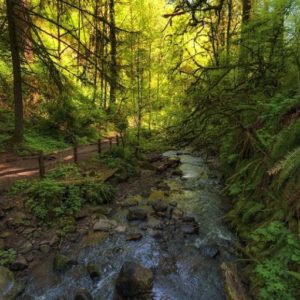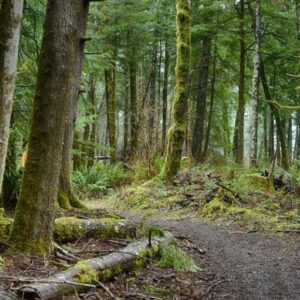Cascade Policy Institute Urges a NO Vote on Measure 26-203
Voters should reject Metro’s tax increase and land grab
In approximately four weeks Portland area voters will receive their November ballots. One of the items is Measure 26-203: a $475 million bond measure by Metro, the regional government for the Portland area. Metro wants the money so it can buy more land for its so-called parks and nature program. Measure 26-203 will raise the region’s property taxes by about $60 million a year.
Cascade Policy Institute urges a vote NO on Measure 26-203. Voters have already approved two such measures—one for $135 million in 1995, and another for $227 million in 2006. Most of that money has been spent to buy up more than 14,000 acres of land. Yet, less than 12% of these lands are available for public use.
Metro has made it clear that many of the parcels purchased since 1995 will never be open for use. In fact, if you try to find a list of all properties bought by Metro with bond money, you won’t be able to. A Metro lawyer told Cascade staff in a meeting this summer that they don’t want the public to know where the park land is because they don’t want the public to visit it.
Eric Fruits, Vice President of Research at Cascade Policy Institute, said, “Most of Metro’s nature properties are Oregon’s own Area 51—they’re owned by the government, they don’t show up on maps, and no one knows what’s going on there.”
In addition, more than two-thirds of the land bought with bond money is outside Metro’s jurisdiction, and nearly 80% is outside the Portland Urban Growth Boundary (UGB). That means most voters will never use Metro parks because they are so far away—even if the areas were open to the public.
Measure 26-203 is on the ballot largely to ensure tax dollars keep flowing to Metro. The measure brings in so much money, the Metro Council can’t figure out how to spend it all. That’s why Metro has earmarked $50 million of the bond funds for “advancing large-scale community visions.” Metro itself says the earmark is “not well-defined” and a leader of 1,000 Friends of Oregon called it a “slush fund.”
For more information on Measure 26-203 and Metro’s parks program, contact Cascade Policy Institute at 503-242-0900.
# # #
Cascade Policy Institute is Oregon’s free market public policy research center. Cascade’s mission is to explore and promote public policy alternatives that foster individual liberty, personal responsibility, and economic opportunity. For more information, visit cascadepolicy.org.
Contact Eric Fruits or John Charles at 503-242-0900 or by email at [email protected] or [email protected] for more information or to schedule an interview.
Why Voters Should Vote NO on Measure 26-203
Here are the top five arguments against Measure 26-203:
- Metro already has more land than it can manage. The focus for the next decade should be on making current lands available for public use. Metro’s largest planned park—Chehalem Ridge near Gaston—has been in Metro ownership for nine years, and there is still no public access. Metro also owns about 1,400 acres in the Sandy River Gorge. These holdings are not shown on any of Metro’s parks and nature maps and Metro has no plans at all to make these properties available for swimming, boating, hiking, or family cookouts. Metro needs to turn these and other areas into parks its residents actually use before voters give Metro a blank check for $475 million.
- Last year Metro spent nearly 25% of all bond expenditures on “administration.” For the past five years, Metro has failed to meet its commitment to keep administrative costs below 10%.
- Metro claims that it has to buy up more land to save it from development, but most properties purchased to date were never threatened because they are outside the UGB. There is no imminent threat of sensitive lands being “paved over” – precisely because the UGB prohibits development and Metro has no plans to expand the UGB to these areas.
- Metro is the only parks manager in the entire tri-county region that won’t allow dogs, even if leashed. For many park users, especially women, that means they won’t use Metro parks at all, because they don’t feel safe walking alone. Metro’s no dog policy is a frequent complaint at community meetings about Metro’s parks program.
- The primary reason for the bond measure is to prevent property tax rates from dropping. At a Metro Council retreat in July 2017, Metro’s Chief Operating Officer explained, “Debt service on the 2006 bonds is expiring. If we wait past 2020 for another bond measure, the current tax rate of 19 cents per thousand of assessed value would drop to zero, and then we would have to admit that our bond measure raises taxes.”
Press Coverage of Metro’s Parks and Nature Program
Nick Budnick, “Green Acres,” Willamette Week, February 2, 2000.
“But a five-week WW review, including dozens of interviews and stacks of real-estate files, found an agency so anxious to secure land that it has streamlined fiscal controls, creating a process that allows even overpriced land to look like a good deal. In 16 out of 32 real-estate acquisitions reviewed by WW, the land values determined by Metro appear inflated, and the combined cost to taxpayers could easily run in the millions.”
“Body Politic,” Willamette Week, October 18, 2006.
“Conceptually, who could argue with the desire to have Metro, the regional government, buy land for green spaces? We do, for the following reasons. First of all, there are several money measures on the ballot deserving your support, and this is the least pressing among them. Second, critics have pointed to the fact that part of the land Metro seeks to buy is so far outside the urban growth boundary that it’s not only beyond Metro’s jurisdiction but is unnecessary, at least for the next several decades. Others have pointed out that some of the targeted land is farmland, which would be taken out of cultivation.”
Nicholas Deshais, “Field of Schemes,” Willamette Week, March 27, 2007.
“The plan would try to return the park’s entire 25 acres back to nature. That includes removing most artificial structures, non-native plants and anything else that smacks of humanity, such as the two baseball fields used by Lakeside Little League. Eventually, the city wants to see a wetland prairie instead of a pitcher’s mound. … ‘The fact that the ball fields are there is an accident of history,’ said Mike Houck, director of the Urban Greenspaces Institute and a member of the master plan’s advisory committee. ‘You wouldn’t put a ball field in the middle of Oaks Bottom.’”
“Steve Lynch, who has lived next to the property for 12 years, said his experience with city and Metro officials has been frustrating. ‘They’ve done the most possible damage in the least amount of time I’ve ever seen any neighbor do,’ Lynch said. ‘They will look you right in the eye and tell you what you want to hear, and tomorrow the trucks are in. I’m not going to be nice anymore.’”
Nigel Jaquiss, “Mayors Urge Metro to Delay Planned May Bond Measure,” Willamette Week, December 6, 2012. Quoting letter from mayors.
“In addition to concerns regarding compression, the plan for the remaining natural area’s bond purchases and impacts on long term maintenance needs are still unclear to our group. Without further information and clarity regarding the plan for past voters’approved investments, it is hard for us to see the value in asking voters for additional resources.”
Dana Tims, “Metro’s bargain land becomes a burden to restore, maintain,” Oregonian, April 13, 2013.
“‘We were rejecting more real estate deals than any private development team in the city,’ Metro Council President Tom Hughes said. ‘The ones we accepted let us stretch those bond dollars a lot further than we thought we could.’ All that stretching, however, came at a cost. Since the bond money can only be used to buy land, Metro’s been stockpiling acreage for years with scant means of maintaining or restoring it.”
Rob Manning, “Metro Has The Land, But Needs Money To Make It Parks,” OPB, May 15, 2013.
“Thousands of people drive past these creeks every day – on Highway 213. But the forest along the creeks can be hard to get to. There are no signs. You have to know the way in – past power lines and thickets of scotch broom and blackberry bushes. Metro land manager, Dan Moeller says the gate in is narrow – on purpose. ‘To manage what’s able to get in and out of here, we had to create some fencing, and we actually had to design this little post system to stop shopping carts from coming into this site.’ Moeller says the gate keeps shopping carts out — but it also blocks kids’ strollers and visitors in wheelchairs. Officials say homeless camps crop up often.”
Peter Wong, “Metro Council seeks extension of park levy,” Portland Tribune, July 5, 2016.
“Metro Councilor Bob Stacey said the North Tualatin Mountains plan, which the council approved April 21, calls for opening only about 25 percentof its 1,400 acres to trails for walking, cycling and horseback riding – and putting most of the rest off-limits.”
“Howl, no: Metro seeks more money for anti-dog park network,” Oregonian, July 5, 2016.
“It may surprise many people in the Portland area to know that Metro is, among other things, the owner of vast swaths of park land. Its holdings, at about 17,000 acres, were amassed largely as a result of two voter-approved funding measures totaling more than $363 million. Metro officials swept up this property for a number of conservation-related purposes, from preserving wildlife habitat to improving water quality. But that’s not all. Improving access to people — who are, after all, paying for all of this — was a goal as well.”
“Voters should say no to Metro’s bid to renew parks levy,” Oregonian, October 19, 2016.
“Most of [Metro’s] efforts are large and expensive, such as committing $60 million in bonding capacity to an otherwise private hotel project at the Oregon Convention Center, which it also oversees. Pockets of rancor about the agency’s reach and influence nest in some suburban and rural venues, where folks have argued Metro has grown too large and operates without sufficient accountability.”
Rachel Monahan, “Portland Begs for Bond Money to Finish Park Work It Started,” Willamette Week, June 5, 2019.
“Behind closed doors, the city of Portland has been lobbying for more money—because the last Metro parks bond, in 2006, helped buy properties for Portland, but City Hall lacks the money to finish restoring or improving them.”




